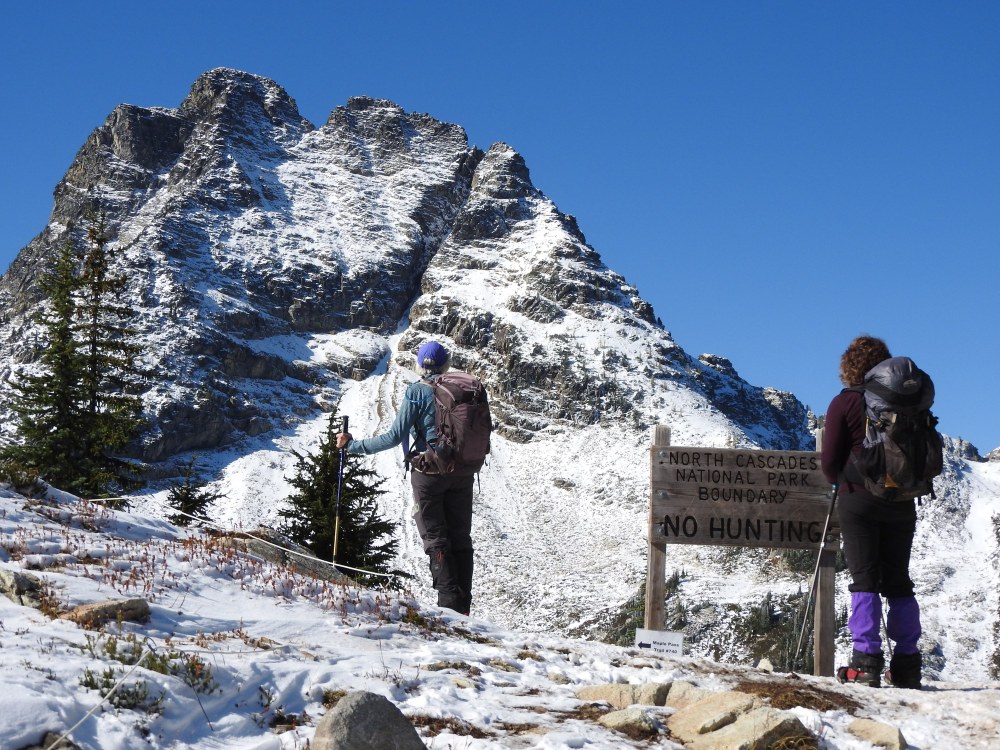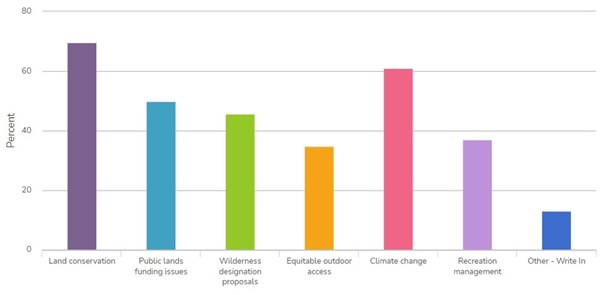
The Mountaineers has a special role to play when it comes to conservation and advocacy. We represent a community of active outdoor users with deep connections to our landscapes, making us effective stewards and powerful advocates for the outdoors.
On April 27, we convened our first-ever Conservation & Advocacy Town Hall to share more about the importance of conservation at The Mountaineers and to hear how we can support our members as we strive to increase our conservation impact. An engaged group of conservation-minded Mountaineers came together across branches, activities, and experience levels to discuss new initiatives and the unique and valuable role that The Mountaineers fills in the broader conservation community.
The stories and ideas you shared with us during this virtual town hall and through our pre-event survey illustrate a deep passion for conserving the Northwest’s landscapes. Your input is instrumental in shaping the future of The Mountaineers conservation and advocacy work.
Why a Conservation & Advocacy Town Hall?
At its core, successful conservation is about people and relationships. Moving conservation and advocacy initiatives forward takes strong relationships - both within the recreation community and with the elected officials and land managers whose decisions impact our landscapes.
By creating new ways for us to hear from you, connect, and engage in conservation and advocacy together, we can continue to grow our community of fierce outdoor advocates to secure much-needed policy wins for the outdoors and our climate.
Below is a recording if you’d like to watch the event:
Talking Conservation and Advocacy
After kicking off the event with a land acknowledgement from E&I Committee member Robert White and a welcome from Conservation & Advocacy Committee Chair Roger Mellem, our Conservation & Advocacy Director Betsy Robblee gave an overview of the conservation mission, history, and strategy at The Mountaineers. She also dug into why advocacy matters, what we advocate for, and how we do that important work.
This prompted some good discussion about advocacy and how The Mountaineers efforts are non-partisan and separate from political action. Participants referenced the importance of personalizing action alerts and sharing personal stories with elected officials. There was a lot of interest in advocacy mentoring and training efforts to build our member’s skills and experience in advocating for the outdoors.
Hearing From You
Through our pre-event survey and some live event polling, we asked our members what issues they’re interested in engaging in, as well as the ways they are currently engaging in this work and how they might want to in the future. Land conservation, climate change, and public lands funding were the top issues for survey respondents, but there is broad interest across the issues we work on.

Image of pre-event survey responses to the question: "Which conservation issues are you most interested in engaging in through The Mountaineers?"
We heard that members could really use help navigating different land management agency processes and translating conservation policy needs into a few accessible actions. More conservation-focused courses, especially ones that cover intermediate-level content, could also be a way to support member engagement in conservation.
The event resulted in many great ideas that will help us elevate and evolve our work across the program in our three focus areas: education, stewardship, and advocacy.
The second part of the event’s staff presentation covered some exciting new conservation initiatives already underway, and those that might come in the future. These accomplishments are made possible by staff and volunteers throughout the organization, as well as many local outdoor recreation and conservation partners.
New Conservation and Advocacy Initiatives
Outdoor Alliance Washington
The Mountaineers is leading the re-energized Outdoor Alliance Washington (OA Washington) network, a group of organizations representing the human-powered outdoor recreation community in Washington. We’re coming together with land managers, elected officials, and the recreation community to strive toward the strongest possible policy outcomes for conservation and climate in Washington State. Read more about OA Washington in our recent trip reports from events with Rep. Marilyn Strickland (WA-10) and Rep. Derek Kilmer (WA-06).
Climate Strategy
As a part of our vision 2022 plan, The Mountaineers made a commitment to reduce our organization’s carbon footprint. Our Carbon Footprint Reduction Committee is leading those efforts by implementing projects at Mountaineers facilities, including solar panels on the Seattle Program Center, LED retrofits, and the Tacoma Program Center Net-Zero Energy Project. We’re also educating our community on this important issue through blogs like those in our “How We’re Reducing Our Carbon Footprint” series.
We’re also ramping up efforts to educate our community about the urgency of addressing climate change through Braided River products campaigns and events like our climate change speaker series. Addressing climate change is also a key component of our advocacy work: Mountaineers members routinely take action to urge lawmakers to secure meaningful investments in federal climate solutions.
Native Land Acknowledgment
One of the ways we’re advancing equity and inclusion is through the practice of land acknowledgments - statements of respect toward native peoples and their ancestral lands. Land acknowledgment is especially important for an outdoor organization like The Mountaineers because our programs, courses, and trips take place on land previously taken from Native peoples. We’ll be sharing more information about our formal Mountaineers land acknowledgment statement soon. This the first step in a longer process of deeper engagement with local Native tribes around recreation and conservation issues.
Future Opportunities
We want to give our members more opportunities to learn about conservation and advocacy, and to take action for the outdoors. We heard strong interest during our town hall in some opportunities we’re considering, like Coffee with the Conservation & Advocacy Director - a way to connect with staff and ask questions about the latest developments in conservation policy and advocacy - and some form of advocacy training and mentoring.
Join our Efforts
Your engagement in this important work doesn’t stop here. We heard from you that conservation communications is the most common way our members hear about conservation and advocacy engagement opportunities, but there’s still a lot of room to grow our community’s awareness and connection to our conservation work.
Subscribing to our monthly conservation-focused newsletter is the best way to stay updated on our conservation work and new opportunities to get involved. This resource includes content like our Conservation 101 blog series posts about public lands and advocacy.
We also encourage you to keep the feedback coming. Please send any feedback from our town hall, ways you’d like to be involved in our work, or general ideas to conservation@mountaineers.org.
We look forward to continuing our conversation about increasing our collective conservation impact at The Mountaineers. Thank you for coming with us on this journey!
 The Mountaineers
The Mountaineers